About the Nanny Survey
The Nanny Institute sponsored a qualitative and quantitative nanny survey. As an education leader in child care, the Nanny Institute’s goal is to share key insights into the nanny profession, articulate ways nannies can advance their careers, and educate families about the child care industry. The survey was authored by Dr. Jill Glathar.
Under no circumstances shall the Nanny Institute, Amslee Institute or Dr. Jill Glathar or their affiliates or partners be liable for any indirect, incidental, consequential, special or exemplary damages arising out of or in connection with access or use of this market research data, whether or not the damages were foreseeable and whether or not the Nanny Institute, Amslee Institute or Dr. Jill Glathar was advised of the possibility of such damages. Any action you take upon the information on this website is strictly at your own risk. The Nanny Institute’s Nanny Survey 2019 is copyrighted with all rights reserved. For additional information about this market research study, contact info@usnannyinstitute.com.
Dr. Jill Glathar has over 15 years of global market research experience. Currently, a Vice President for global market research and consulting firm, Dr. Glathar earned a Doctor of Philosophy (Ph.D.) in US Voting Behavior and Political Psychology from Stony Brook University. Dr. Glathar completed this project as an independent consultant.
This market research information is provided to help nannies and family-employers better understand the child care industry and should not be construed as legal or financial advice.
Views, thoughts, and opinions expressed in the market survey results are from survey respondents and do not communicate the views of Dr. Glathar or the Nanny Institute.

Nanny Survey Contents
1 Survey Objectives
2 Nanny Survey Methodology
3 Nanny Survey Key Findings
4 Nanny Infographics
5 Babysitter or Professional?
6 Gig or Career?
7 Employee or Friend
8 Alignment on Job Duties and Compensation
9 Non Traditional Work Environment
Section 1: Survey Objectives
Unlike other professions, nannies work in a family’s home, where they can have a close, personal relationship with the children in their care and the parents. But this environment can be difficult for nannies as they struggle to navigate the highly-personal and professional role as an employee. A key challenge is when lines between being a friend, a family member, and an employee become blurred, whether initiated by the nanny, the family, or both. In part, this challenge emerges from nannies and families holding different views of qualifications and job responsibilities, leading to differences of opinion about compensation, benefits, and overall respect for nannies as professionals. This research – including discussions with nannies and a survey – identifies meaningful insights about the challenges nannies experience. The primary objective is to understand nanny perceptions of their jobs including what it means to be a professional nanny and their work environment, by answering the following questions:
- How can professional nannies differentiate themselves from babysitters? Given the wide range of child-development training, education, and work-experience, nannies need to have professional skills that families value and recognize.
- What can nannies do to gain respect for their career choice? Every child-care position is uniquely heightening the need for nannies to have advanced training and skills, work-agreements, and reinforce their profession through behaviors and actions.
- What is the preferred role between the nanny and family and how does this help or hurt their careers? Most nannies want to be considered a friend or family member, but not if this leads to a lack of respect for the job they are doing.
- What job responsibilities are standard and when is additional compensation deserved? Serving healthy snacks and cleaning up after lunch with the children is typically part of a nanny’s responsibilities. But what about dishes leftover from the family’s breakfast?
- When issues arise as a result of working in a private home, what can nannies do to resolve them? Working in a private home exposes nannies to the realities of a family’s life, which sometimes puts them in difficult situations: feeling unsafe, being asked to keep the family’s secrets, and at times, having to make decisions about what is in the best interest of the children.
Section 2: Nanny Survey Methodology
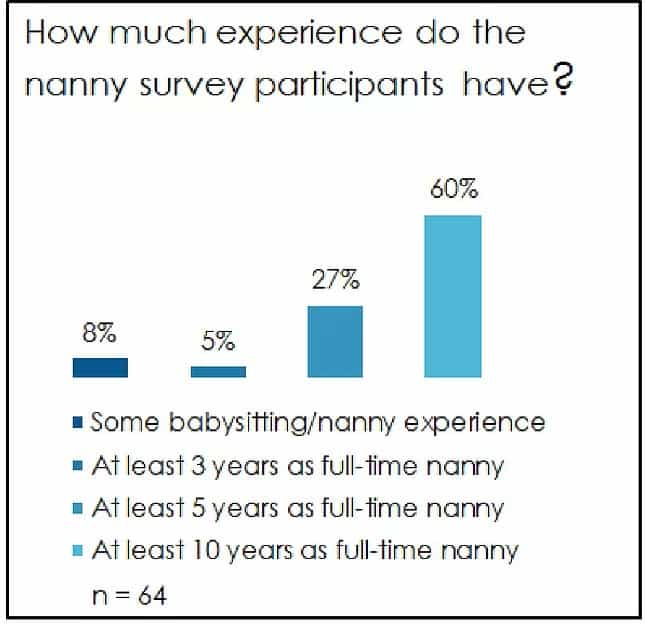
Participating nannies were informed the market research was sponsored by Amslee (now Nanny) Institute. Identities are confidential: names are not connected to responses in the presentation of the results. Pencil and paper surveys were completed at the Nannypalooza East conference in Philadelphia, Pennsylvania on November 3-4, 2018. All Nannypalooza East attendees were eligible and 64 nannies completed the 5-minute survey. Two participants were randomly chosen and won a backpack and a $25 gift card raffle. Personal information was used to contact the raffle winners and then destroyed. Of the 64 survey participants, 8% had some babysitting or nanny experience, 5% had at least 3 years of full-time nanny experience, 27% had at least 5 years of full-time nanny experiences, and 60% had at least 10 years of full-time nanny experience. All participating nannies were privately employed by families, none were employed by nanny agencies. Data shown in this report represents a portion of all collected information. Not all participants answered all questions and some questions allowed for multiple responses. Additional data was collected and is on file with Nanny Institute.
Section 3: Nanny Survey Key Findings
Nannies and the families that employ them hold different views about what being a nanny means based on qualifications, training, and skills. this often leads to conflicts about job expectations and compensation. The desire for a close, personal relationship with the children in their care and the family-employer often leads to nannies feeling taken advantage of, disrespected, and under-compensated.
Key Insights for Nannies and Professional Child Care Providers
- Behave as a Professional. Be aware of how you handle yourself as an employee and role model for the children in your care. As you strive to teach children responsibility, respect for rules, and how to treat others, you should arrive to work on time, dress appropriately, and be polite.
- Be an Employee First. Gaining respect means putting yourself first as an employee and being a friend or extended family member second. This can be hard for some but if you don’t respect the job and its duties, it is unlikely the family-employer will either.
- Demonstrate Valued Skills. CPR and First Aid certifications are fundamental for all child care positions. To credibly communicate advanced child care skills and training, you need transcripts and certifications. Invest in training to learn and apply food safety, creating learning environments, positive discipline, helping with homework, and the developmental milestones as children grow from newborn through primary years.
- Start with and Maintain a Written Work Agreement. Work agreements are a living document that helps nannies and nanny families by setting clear expectations for job duties and compensation. While it may be difficult to put your expectations into writing, having a clear and legal agreement is in your best interest as a professional child care provider.
Section 4: Nanny Infographics
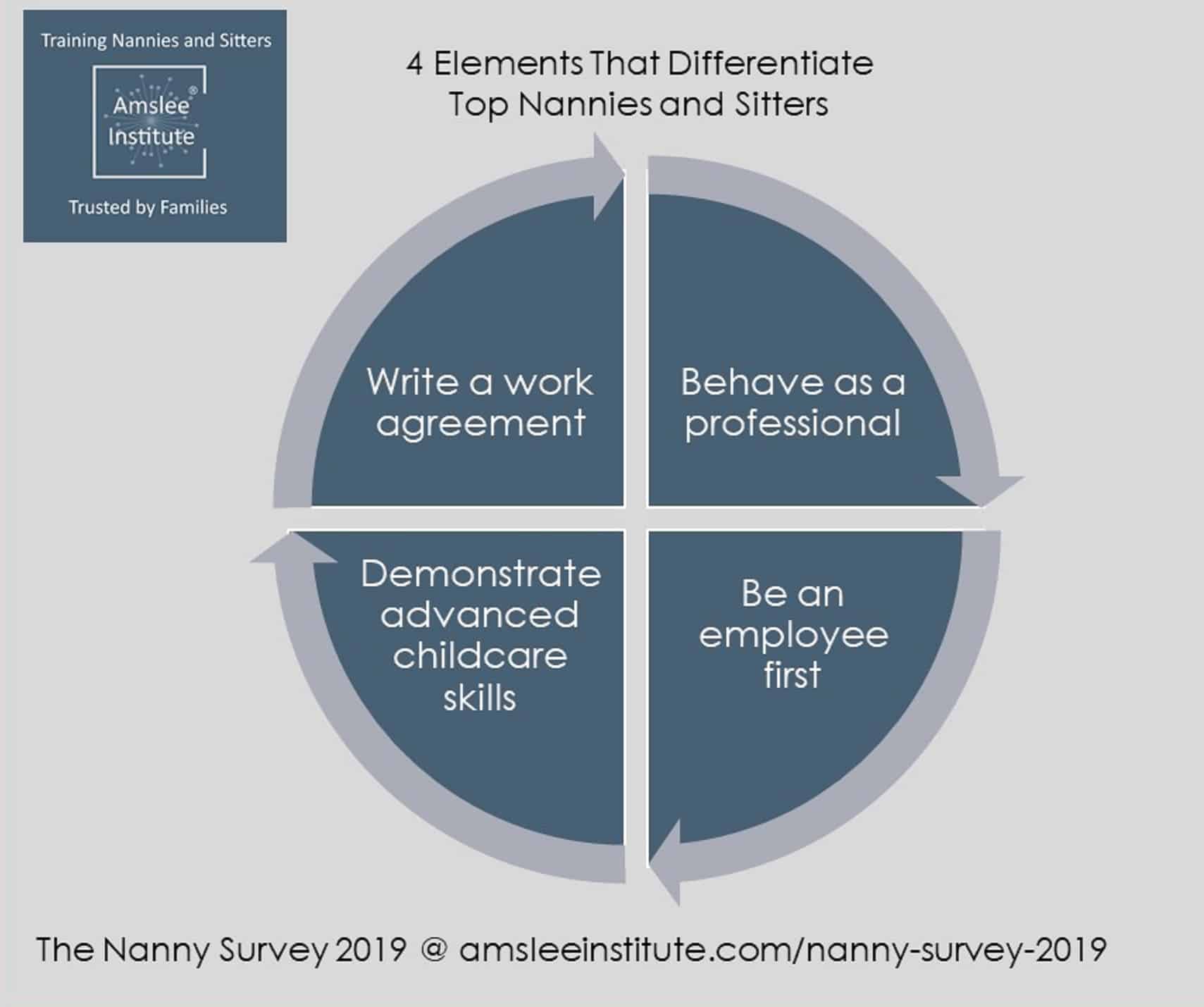
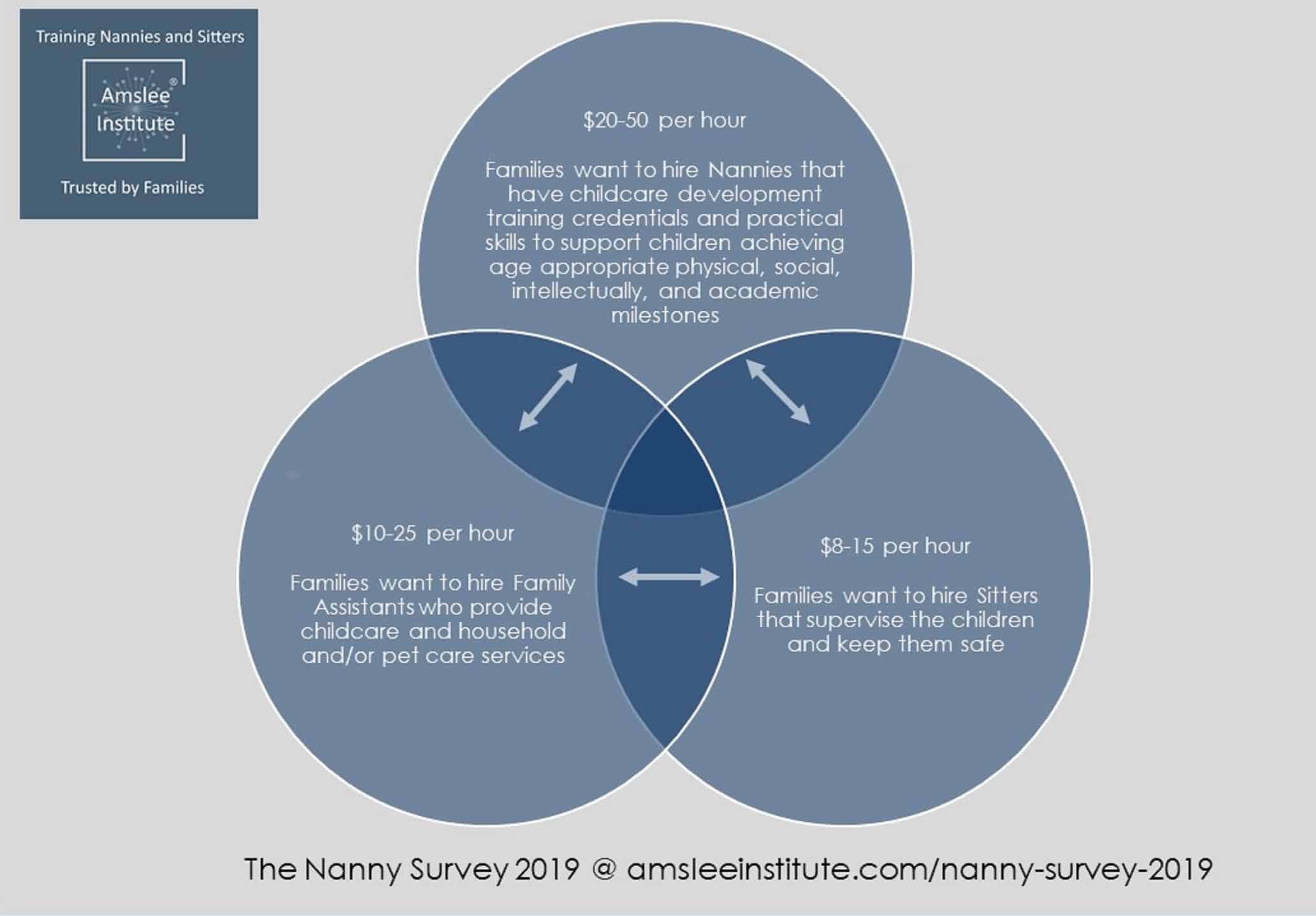
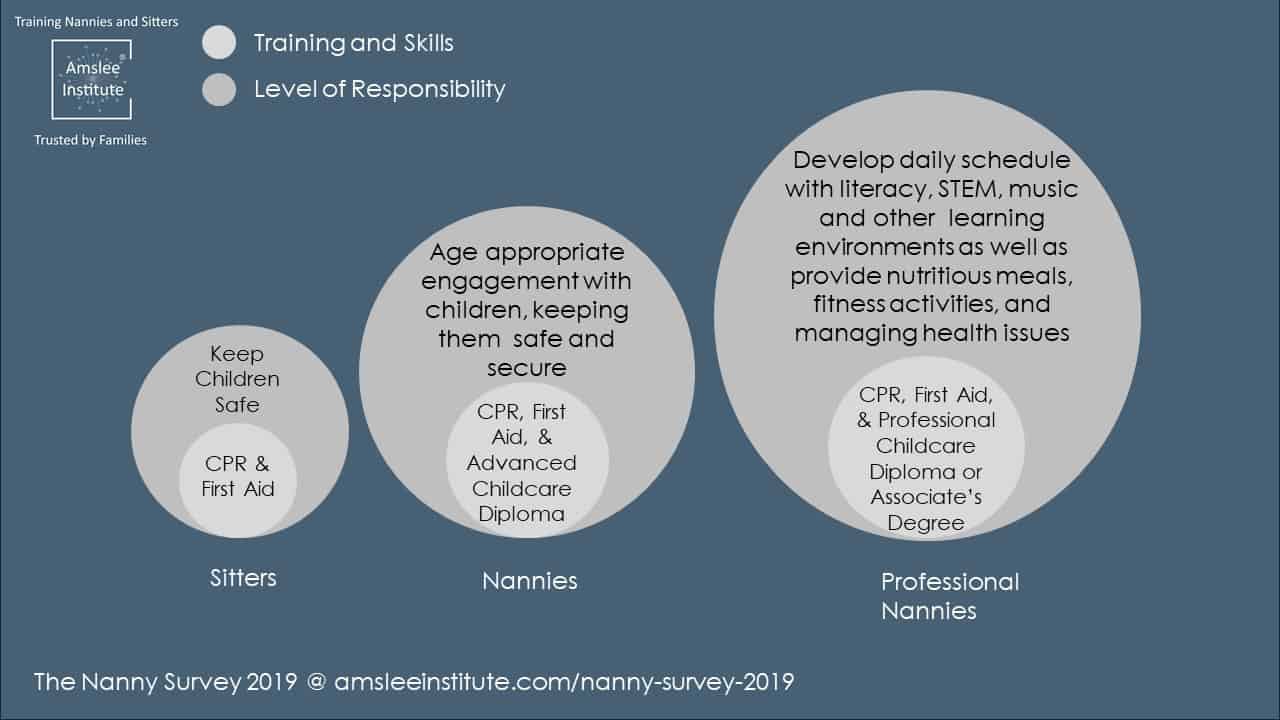
Section 5: Babysitter or Professional?
Another challenge nannies face when seeking professional recognition are the many titles in the industry: mother’s helpers, babysitters, nanny, professional nanny, family assistant, household manager, and so on. Each position is different when it comes to providing child care as well as the responsibilities in the home. While family-employers may not always understand the difference, it’s important that family-employers and child care providers agree on the job responsibilities.
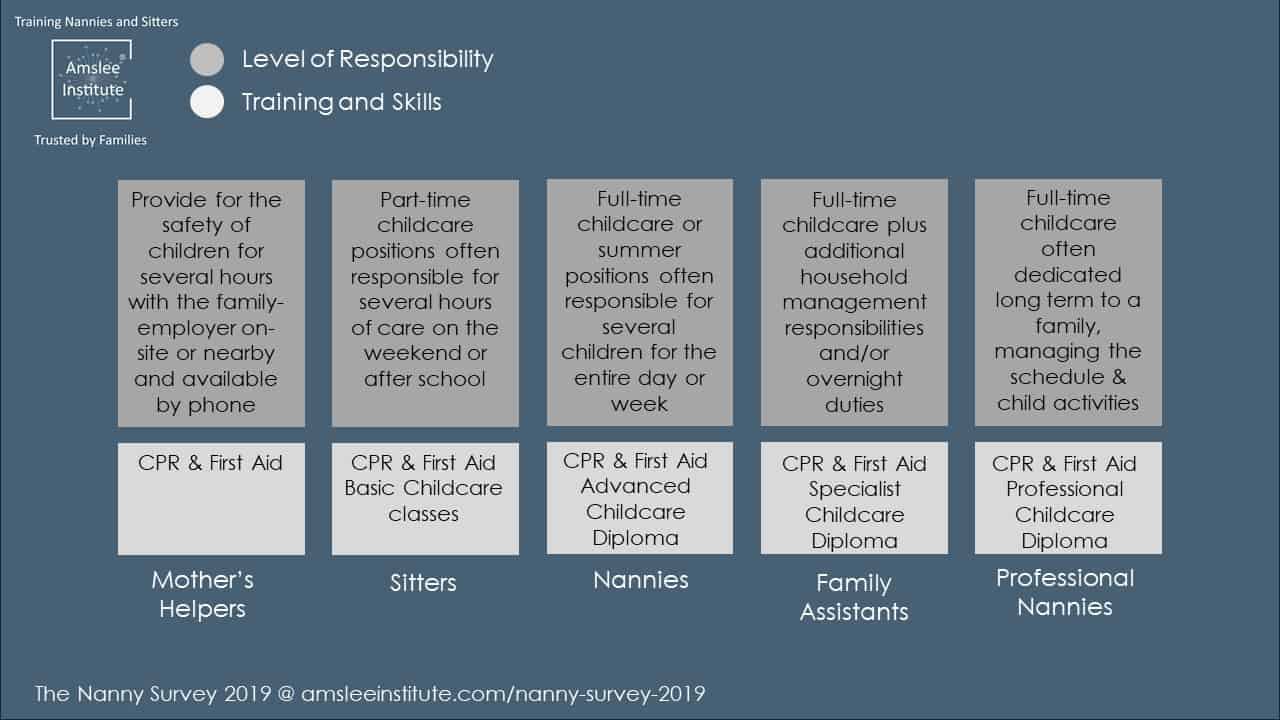
Declaring Oneself a “professional nanny” Does Not Align with the Education, Experience, or Licensing Required to be a “Professional” in Other Industries
Unlike other professions, being a professional nanny in the United States does not require educational or child care degrees, advanced training, internships, or any designated skills or experience. The Nanny Survey 2019 found that
- 63% of nannies do not have a college degree,
- 74% of nannies believe only 3 years of experience are needed to be a professional nanny
- 8% feel the experience is the only qualification needed to be a professional nanny.
Unlike nursing assistants, beauticians, and teachers, all of whom must have a license, family-employers are not able to easily understand what differentiates a babysitter from a family assistant or professional nanny. Adding to the confusion, several organizations offer professional nanny certifications without requiring training or proof of child care experience. Most nannies surveyed report not having a college degree, believing experience is more important than education. Thus, declaring oneself a ‘professional’ nanny may not satisfy family-employers or achieve equitable compensation.
- 63% of nannies do not have a college degree (associates or bachelors)
- 74% of nannies believe only 3 years of experience are needed to be a professional nanny
- 8% of nannies feel the experience is the only qualification needed to be a professional nanny
“I don’t think it is necessary to have worked as a nanny to be a professional nanny. Being a professional nanny has to do with the amount of responsibility.”
“Families want a nanny who has CPR and First Aid and is willing to work hard.”
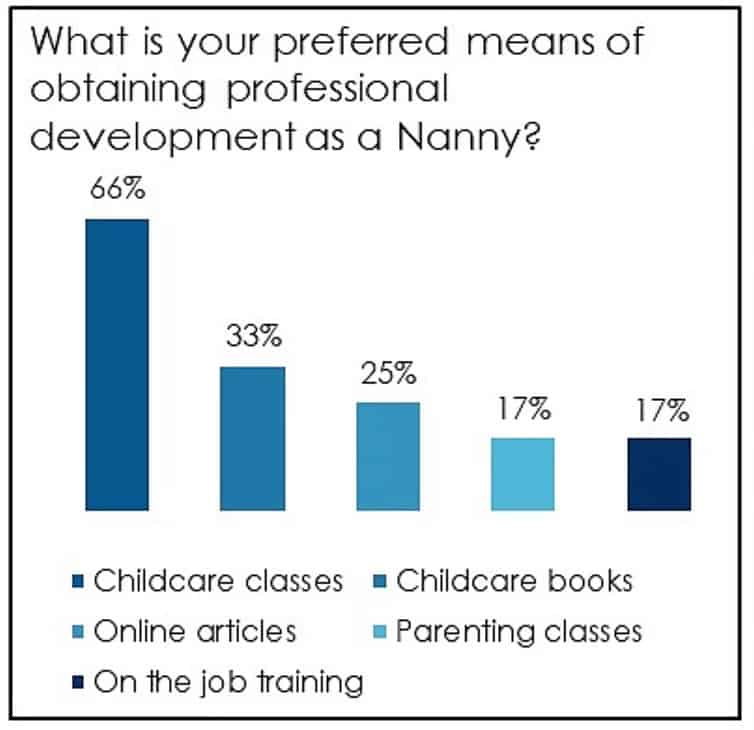
Families Often Equate Nannies with Babysitters, Not Recognizing the Value of Child Development Skills
One of the best indicators of perceived valued is compensation. Many family-employers offer $8-15 an hour, viewing child care as a supervisory position requiring little training or experience. Other family-employers view child care as an extension of the child’s education and development and are willing to pay $15-25+ per hour. These family-employers seek a child care provider who can invest in the social, physical, emotional and intellectual development of their children. At the heart of this issue is that family-employers may not fully comprehend the value of child development skills.
“They [the family] think what I do is babysitting, not a professional career that develops and teaches their child. I’ve worked for my family for five years and still, I feel disposable.”
“Parents need to understand what I do isn’t just ‘child care’, it is “QUALITY” child care.”
According to Nannies, the Key to be a Professional Nanny is to Facilitate Child Development
To facilitate child development, nannies communicated a need to understand basic childhood development theories and have the training to create nurturing environments and implement age-appropriate activities that advance emotional, physical, and intellectual development. The preferred modalities to develop professionally are child care classes (66%), child care books (33%), online articles (25%), parenting classes (17%), and on the job training (17%). The sum does not equal 100% as this question allowed multiple responses.
48of nannies want family employers to pay for ongoing training and education.
Nannies report that their family-employer supports continuing education or training with 52% of families paying for training, 31% of families would pay for training, and only 17% would not pay for training.
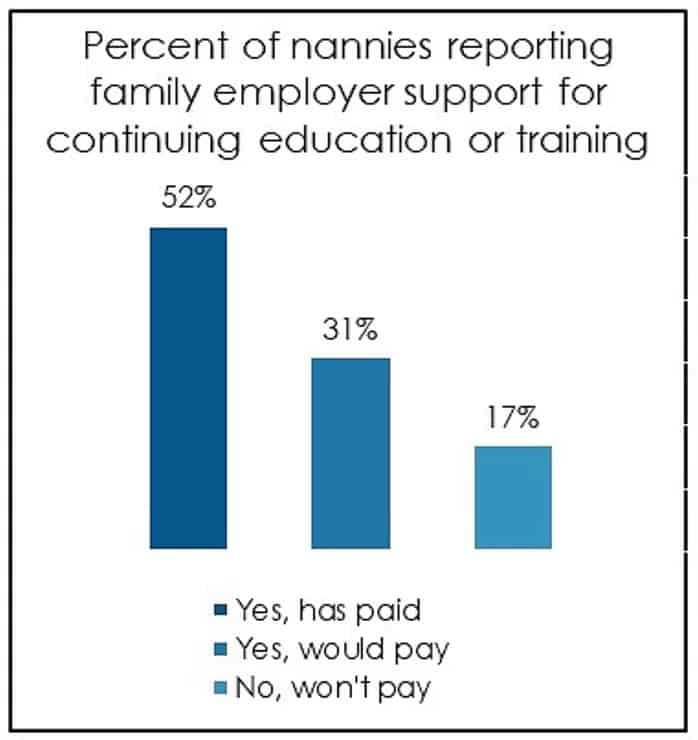
“We have dedicated our lives to enriching the lives of children. We are coming in with a skilled mind-set. I put my training on my resume and it has helped me get better jobs. We are not babysitters.”
Section 6: Gig or Career?
It’s up to the Nanny – it can be a gig or a career. Careers are traditionally defined as a series of stable jobs for an employer over several years that are hourly or salaried and task-based. Career generally progress through jobs that have increasing levels of responsibility and independent work. Gigs are work arrangements for a certain period of time, often for the life of a specific project or as long as the employer has that specific need.
Is Being a Nanny Respected as a Career?
75% of nannies surveyed feel family-employers [in general] respect the nanny profession but nannies do not feel respected in their individual employment situations. Nannies seek employers who respect child care and are more likely to seek other positions when they do not feel respected.
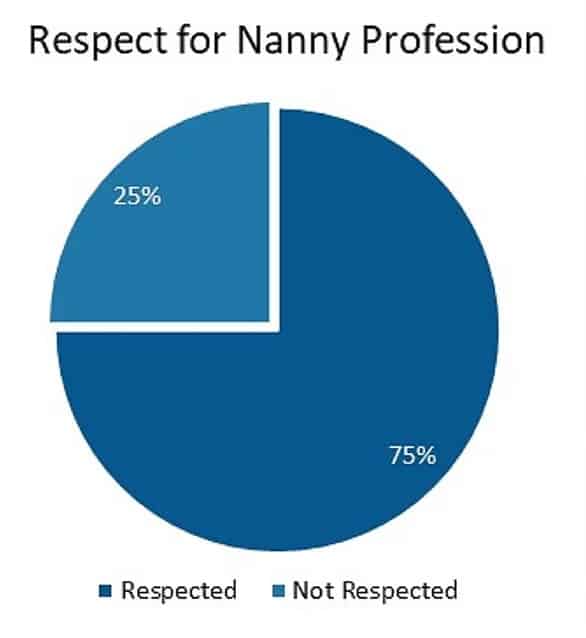
“I think society views nannies as professionals but the families who hire us don’t. They just don’t think what we do is an actual profession.”
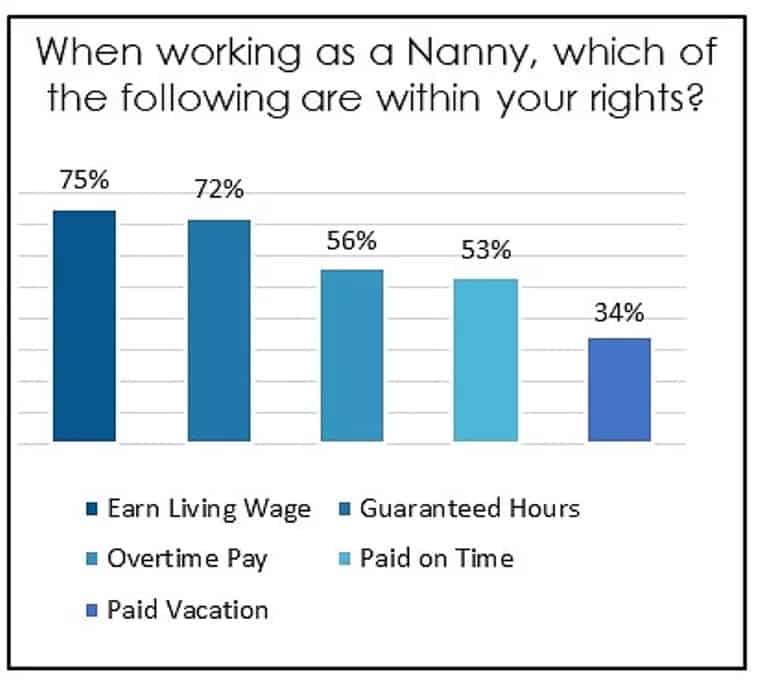
Nannies Seek Same Employee Rights as Other Employees
The Nanny Survey 2019 highlights that the top desire as an employee is to earn a living wage (75%). Nannies also seek guaranteed hours (72%), overtime pay (56%), paid on time (53%), and paid vacation (34%). The sum does not equal 100% as this question allowed for multiple responses.
Ways Family Employers Show Respect to Nannies
The Nanny Survey 2019 results communicate ways family employers can show respect to nannies. Compensation in the form of paid vacation and paid training top the list at 50% and 48%, respectively. Not canceling came in at 44% and paying fair wages was selected by 42%. The sum does not equal 100% as this question allowed for multiple responses.
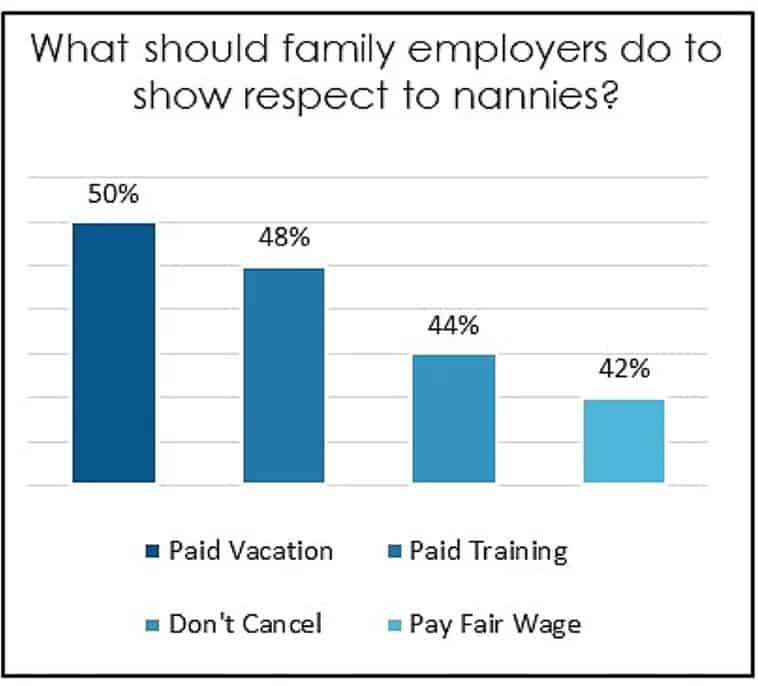
Nannies Need Some College for Top Jobs
Nanny views on the level of education required to vary with
- 11% believing family employers prefer only high school
- 59% believing that families prefer some college when deciding to hire a nanny.
The survey found
- 29% believe family employers look for CPR and First Aid training
- 26% of family employers seek a nanny with a bachelor’s degree.
- 59% of nannies believe families seek college-level training (Diploma, Associate or Bachelor Degree)
Work Agreements Help Establish Professional Boundaries but Do Not Guarantee Employee Respect
Some families and nannies work together without a contract or work agreement, but work agreements help define the role and compensation. Many nannies have difficulty talking about the agreement and can fail to establish a strong employer-employee relationship. Setting up a work agreement with my family was difficult and didn’t get me what I wanted. In the future, I’ll negotiate for mileage and gas, and also establish that over 40 hours does entitle me to overtime. It’s really a tough conversation during an interview to talk about a contract. As soon as you say something, they [the family employer] want their lawyer to review. It becomes a big deal, which is really uncomfortable. I thought I did a great job with my work agreement, but the family isn’t doing their part. They keep making excuses to not pay me on time or pay overtime. I don’t know what to do to get them to treat me like a professional.
- 92% of nannies surveyed in this study have a work agreement
Section 7: Employee or Friend
Many nannies and family employers find it challenging to successfully navigate their relationship as many nannies have a close relationship with the family. Nannies and family employers can struggle to maintain boundaries as they build familial style working relationships.
- 39% of nannies want to be treated as an equal in the family, not an employee
Nannies Want To Be an Extended Family Member or Friend
When asked which best describes their relationship with the family employer, 76% of nannies feel they are treated as a family member or close friend. Being treated as a family member was selected most at 56% while being a close friend was selected by 20%. Casual friendship was selected 11% and an employment relationship was selected 13%.
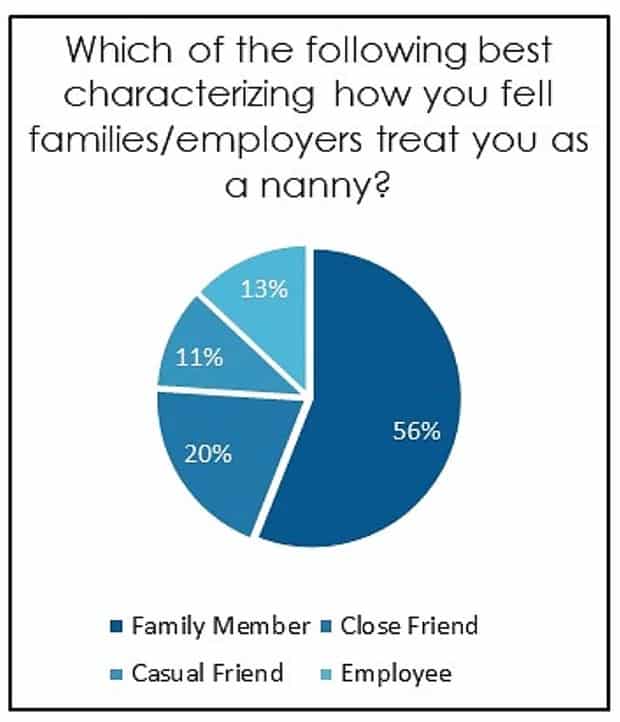
“The best part of being a nanny is the personal satisfaction that the baby I have been caring for since she was born just learned how to say my name for the first time last week.”
“Even though my family employs me, I am part of the family…closer to the kids than their parents. I deserve as much respect as the parents give to each other for all that I do.”
Behaving as a Family Member or Friend Causes Frustration
When family employers and nannies behave as extended family members or close friends, nannies often experience frustration as boundaries become blurred. Loss of the employee relationship creates challenges including:
- Emotional turmoil in the work environment when oversharing or misinterpreting social conventions
- Greater difficulty determining when it is family-or-friend time versus compensated hours, generating resentment with misaligned expectations
- Inability to obtain equitable pay is viewed as a family member or friend who is just helping out
“I don’t understand why I am not included in things the family does. I’m raising their children. The kids know me so when the whole family gets together for special occasions, I should be there.”
“It hurts when I am not included. I was with one family for five years. Afterward, the family didn’t call, invite me over to see the kids. I formed a bond with the children so not being involved was really hard.”
Section 8: Alignment on Job Duties and Compensation
Every nanny job is customized to a specific family, creating different duties and levels of responsibility. With this range, it is important for family employers and nannies to clearly define job responsibilities, compensation, and expectations.
- 48% of nannies include light housekeeping (laundry, dishes, vacuuming) as part of a nanny’s job
Nannies are Responsible for Child Care, not Housekeeping
Nannies sign up for child care but less than half (48%) of nannies feel their fundamental responsibilities include housekeeping skills (such as laundry, dishwashing, vacuuming) not directly tied to child care. Only 14% of nannies feel their responsibilities include pet care, grocery shopping or other family services. The sum does not equal 100% as this question allowed for multiple responses.
Nannies Struggle to Get Compensated for Additional Work
Many times, nannies struggle with expanding job responsibilities and often have difficulty getting compensated for additional work. Families may ask nannies to work longer hours and/or complete tasks that were not originally defined in the job description and not recognize the additional compensation due.
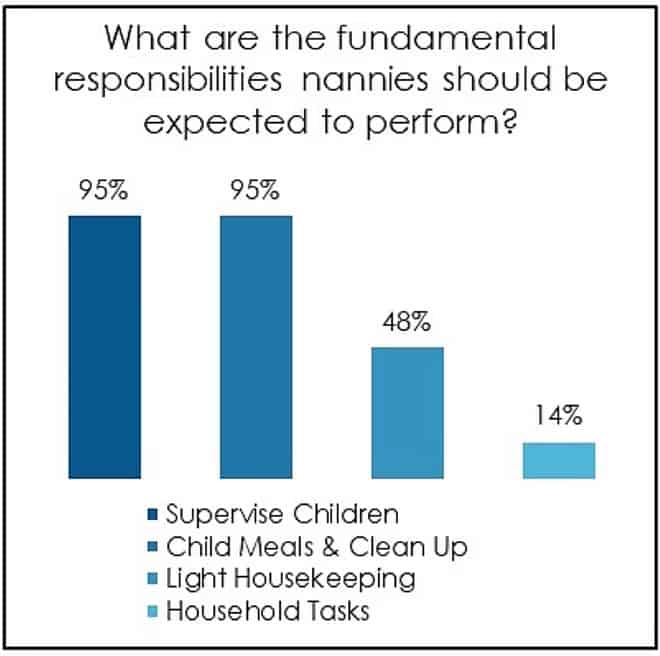
“My current family is not willing to honor labor laws and pay over time. My average work week is 70+ hours. When I tried to talk to my family about over time, they told me if I didn’t like things, to just leave.”
“Families say they need a certain number of hours a week but change this number all the time based on their schedule. I am supposed to work 40 hours but some weeks it’s 60. I just don’t know my schedule from day-to-day.”
Nannies Feel Misunderstood and Undervalued
Nannies feel their profession deserves the same benefits and compensations as traditional jobs and thus feel undervalued. Many nannies also feel manipulated by family employers to stay in underpaying jobs.
“Parents need to understand that their jobs entitle them to paid vacation and benefits. Being a nanny is our job so we should have the same benefits. A lot of times, parents know how hard it is for a nanny to leave.”
“These families are banking on the fact that we become super attached to the kids. And we do; we care about the kids. The families know it breaks our hearts to leave. They count on this and don’t pay us what they should.”
Section 9: Non Traditional Work Environment
As independent workers in the employer’s home, nannies face unique challenges. From managing their own safety to keeping family secrets, being a nanny has non-traditional responsibilities. In a role without peers and co-workers who work for the same family, nannies use technology to connect with others and engage as a community.
Nannies Have Felt Unsafe While at Work
Most nannies feel safe working in the family’s home; however, 33% of nannies report feeling unsafe on the job. Verbal or emotional abuse was the most commonly reported issue at 27% followed by being physically threatened (11%), discriminated against (11%), and sexually harassed (9%). The sum does not equal 100% as this question allowed for multiple responses.
- 33% of nannies report having felt unsafe on the job
- 27% of nannies report being subjected to verbal or emotional abuse on the job
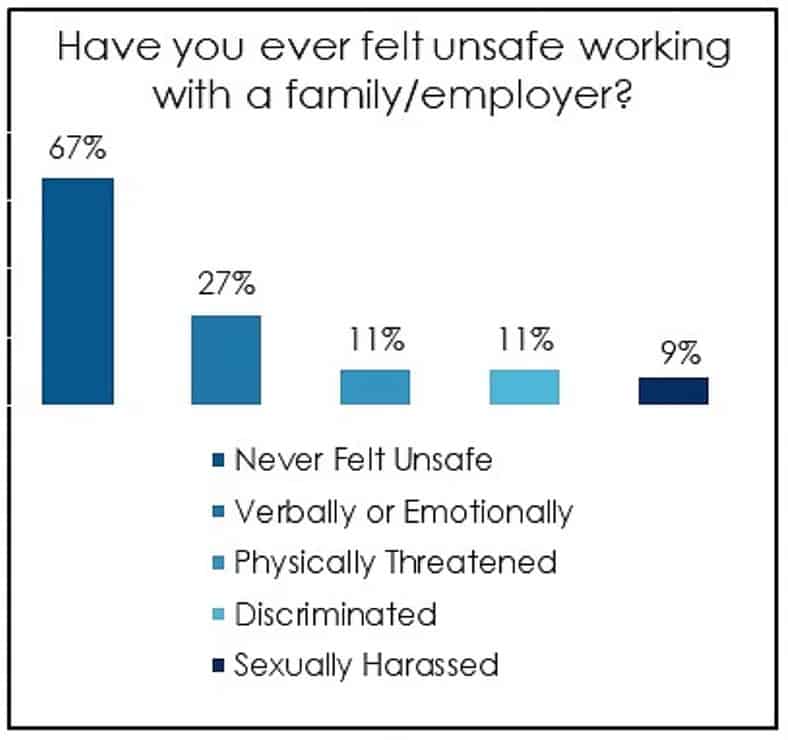
“My MB [Mom Boss] screamed at me when I called in sick. I didn’t know I was going to wake up sick.”
Nannies Keep Family Secrets
As confidentiality and non-disclosure agreements are increasing as a condition of employment for nannies, families without these agreements still expect a certain level of privacy. Nanny’s responses often depend on whether the nanny feels more like a family member, friend, or employee.
- 67% of nannies would not report infidelity even with first-hand knowledge
- 33% would confront the spouse or partner engaging in infidelity
“The dad brought his date to the house. I didn’t know what to do. In the end, I didn’t say anything because I’m afraid of losing my job.”

Nannies Use Technology to Connect with Families and Nannies
Working away from home but most often without other adults, nannies use technology, namely cell phones, and social media to connect with their family employer, friends, and other nannies. Most nannies (68%) use their cell phone during working hours for emergencies or only check their phone during breaks; however, 33% of nannies will check their phone whenever they want. Knowing the limitations on screen time for children, most children reportedly get less than an hour of exposure to television, phones, learning computers, and/or video games.
- Only 8% of nannies reported more than an hour of screen time
- 25% reported between 15 minutes and an hour
- 19% reporting less than 15 minutes
- 48% of nannies reported no screen time
Nannies connect with other nannies on social media. 83% of nannies responding to the survey use Facebook to read about nanny industry news, search for a job, and to find training opportunities and child care events. Nannies responding use social media to post and find available new jobs (38%) and to share photos and information about their day (28%).
- 73% view and post on social media to connect with other nannies
- 28% share photos and information about their day on social media
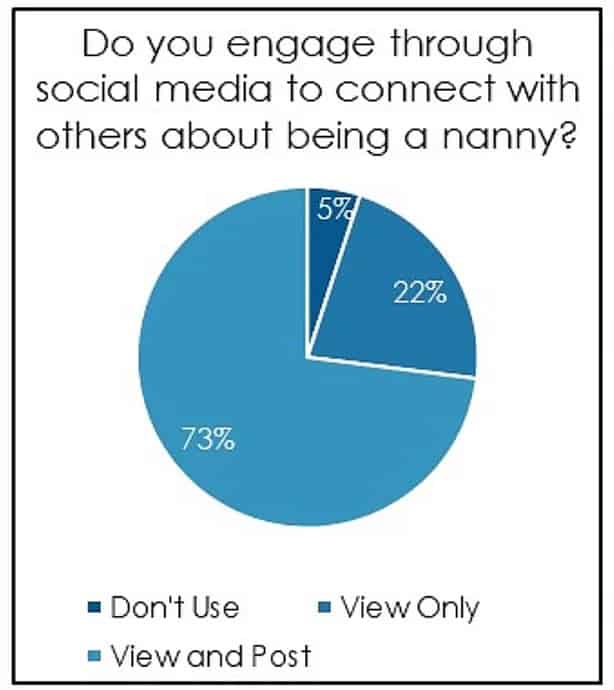
Disclaimer
The Nanny Survey 2019 is copyrighted with all rights reserved. For additional information about this market research study, contact the Nanny Institute at info@usnanny.org.
